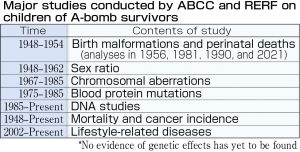Genetic effects from exposure to A-bomb radiation not found in RERF reanalysis of postwar study on newborns
May 21, 2021
by Junji Akechi, Staff Writer
On April 16, the Radiation Effects Research Foundation (RERF, located in Hiroshima’s Minami Ward) announced the results of the reanalysis of a study of newborns initially conducted by the Atomic Bomb Casualty Commission (ABCC), RERF’s predecessor organization, after World War II. The results obtained from the reanalysis of parental exposure to the atomic bombing and congenital malformations and other issues found in their children indicated no major differences compared with the results of three previous analyses. As a result, RERF concluded that “no statistically significant association was found.”
RERF initiated the reappraisal of the previous studies in 2015, the fourth analysis of the study following analyses conducted in 1956, 1981, and 1990. The reanalysis was conducted against the backdrop of heightened public interest in the genetic effects of radiation due to the 2011 nuclear accident at the Fukushima No. 1 (Daiichi) nuclear power plant, operated by the Tokyo Electric Company. RERF utilized the latest statistical techniques, including DS02, a dosimetry system confirmed by Japan and U.S. scientists in 2003, to conduct the reanalysis.
Of around 77,000 newborns examined by ABCC between 1948 and 1954, about 71,000 newborns, excluding multiple birth babies, were subjects of the reanalysis. RERF examined the association between parental exposure to the atomic bombing and problems in the newborns as defined into three categories: congenital malformations observed at birth; perinatal deaths within seven days from birth; and perinatal deaths within an expanded timeframe of 14 days from birth.
RERF reported that results of the reanalysis showed increased trends for risks of congenital malformations and deaths due to parental exposure to the atomic bombing, but the results fell short of statistical significance. Michiko Yamada, division chief of Radiology in RERF’s Department of Clinical Studies, explained, “Other factors, such as poverty experienced by the A-bomb survivors, are thought to have affected the trend of increased risk. We need to approach this issue with multiple methods in order to come to a conclusion.”
RERF has examined mortality and disease incidence in second-generation A-bomb survivors to investigate genetic effects of A-bomb radiation. However, to this point in time, no genetic effects have been identified. Ohtsura Niwa, RERF chairman, expressed his intent to promote debate about whole-genome analysis of the DNA of second-generation A-bomb survivors and their parents. “I myself would like to conduct such analyses, but careful deliberations are necessary.”
(Originally published on April 17, 2021)
On April 16, the Radiation Effects Research Foundation (RERF, located in Hiroshima’s Minami Ward) announced the results of the reanalysis of a study of newborns initially conducted by the Atomic Bomb Casualty Commission (ABCC), RERF’s predecessor organization, after World War II. The results obtained from the reanalysis of parental exposure to the atomic bombing and congenital malformations and other issues found in their children indicated no major differences compared with the results of three previous analyses. As a result, RERF concluded that “no statistically significant association was found.”
RERF initiated the reappraisal of the previous studies in 2015, the fourth analysis of the study following analyses conducted in 1956, 1981, and 1990. The reanalysis was conducted against the backdrop of heightened public interest in the genetic effects of radiation due to the 2011 nuclear accident at the Fukushima No. 1 (Daiichi) nuclear power plant, operated by the Tokyo Electric Company. RERF utilized the latest statistical techniques, including DS02, a dosimetry system confirmed by Japan and U.S. scientists in 2003, to conduct the reanalysis.
Of around 77,000 newborns examined by ABCC between 1948 and 1954, about 71,000 newborns, excluding multiple birth babies, were subjects of the reanalysis. RERF examined the association between parental exposure to the atomic bombing and problems in the newborns as defined into three categories: congenital malformations observed at birth; perinatal deaths within seven days from birth; and perinatal deaths within an expanded timeframe of 14 days from birth.
RERF reported that results of the reanalysis showed increased trends for risks of congenital malformations and deaths due to parental exposure to the atomic bombing, but the results fell short of statistical significance. Michiko Yamada, division chief of Radiology in RERF’s Department of Clinical Studies, explained, “Other factors, such as poverty experienced by the A-bomb survivors, are thought to have affected the trend of increased risk. We need to approach this issue with multiple methods in order to come to a conclusion.”
RERF has examined mortality and disease incidence in second-generation A-bomb survivors to investigate genetic effects of A-bomb radiation. However, to this point in time, no genetic effects have been identified. Ohtsura Niwa, RERF chairman, expressed his intent to promote debate about whole-genome analysis of the DNA of second-generation A-bomb survivors and their parents. “I myself would like to conduct such analyses, but careful deliberations are necessary.”
(Originally published on April 17, 2021)








